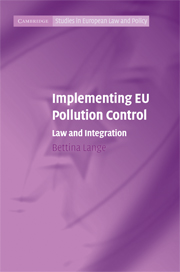Book contents
- Frontmatter
- Contents
- Series editors’ preface
- Acknowledgements
- Update on the IPPC Directive
- Abbreviations
- 1 Introduction
- 2 Traditional perspectives on the role of law in EU integration
- 3 Critical perspectives on the role of law in EU integration
- 4 What is EU ‘law in action’?
- 5 Talking interests – generating procedure: How political discourse constructs key aspects of BAT determinations in BREFs
- 6 Variation in open and closed BAT norms
- 7 What does it cost? Economic discourse in the determination of ‘the best available techniques’ under the IPPC directive
- 8 Does ‘law’ integrate? Licensing German and English coke ovens under the IPPC Directive
- 9 Conclusion
- Appendix: Methodology
- Bibliography
- Index
7 - What does it cost? Economic discourse in the determination of ‘the best available techniques’ under the IPPC directive
Published online by Cambridge University Press: 07 August 2009
- Frontmatter
- Contents
- Series editors’ preface
- Acknowledgements
- Update on the IPPC Directive
- Abbreviations
- 1 Introduction
- 2 Traditional perspectives on the role of law in EU integration
- 3 Critical perspectives on the role of law in EU integration
- 4 What is EU ‘law in action’?
- 5 Talking interests – generating procedure: How political discourse constructs key aspects of BAT determinations in BREFs
- 6 Variation in open and closed BAT norms
- 7 What does it cost? Economic discourse in the determination of ‘the best available techniques’ under the IPPC directive
- 8 Does ‘law’ integrate? Licensing German and English coke ovens under the IPPC Directive
- 9 Conclusion
- Appendix: Methodology
- Bibliography
- Index
Summary
Introduction
Chapter 6 discussed how technical and political discourses generate variation in open and closed BAT norms, a key characteristic of the implementation of the IPPC Directive. It is not just political and technical discourses, but also economic discourse which plays an important role in the search for ‘the best available techniques’ during the implementation of the IPPC Directive. This chapter explores how cost arguments feature in discussions about what counts as BAT either for a whole industrial sector or for a specific installation. According to Art. 2 (11) second indent of the IPPC Directive, costs are a criterion for determining what constitutes ‘the best available techniques’. The text of the Directive, however, does not provide a methodology for determining the ‘costs’ and ‘advantages’ of techniques. It is therefore important to examine how participants in BAT determinations actually talk about costs. What does an analysis of cost arguments in BAT determinations reveal about the nature of EU law? Does it confirm or question the picture of EU law as relatively autonomous in relation to its political, economic and technical contexts, or as capable of being wielded in an instrumental manner, and as something to be found ‘in the law books’?
This chapter argues that an economic discourse is central to how BAT is defined. It also suggests that this economic discourse overlaps with political and technical discourses on BAT.
- Type
- Chapter
- Information
- Implementing EU Pollution ControlLaw and Integration, pp. 191 - 226Publisher: Cambridge University PressPrint publication year: 2008

